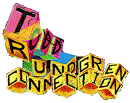 The Todd Rundgren Connection is brought to you by
Roger D. Linder &
The Todd Rundgren Connection is brought to you by
Roger D. Linder &
 Rocemabra Web Services.
Rocemabra Web Services.

Nearly Human, Rundgren's first solo release of new material since his 1985 look-Ma-no-instruments album A Cappella, actually produces the opposite effect -- technique plus brains plus vision equals vintage Seventies Todd pop. Ever since Something/Anything?, Rundgren has diligently made records according to his own aesthetic and utopian spirituality, only intermittently exercising his ability to create lush, loving ballads and bright sing-along singles. Admittedly, he's made more than enough of those to fill Rhino's new almost-two-hour-long compilation, Anthology (1968-1985). (There's another volume dedicated to his work with the band Utopia.) Still, Nearly Human is as deliciously retro as Rundgren has ever been, not only begging comparison to the bumper crop of radio-ready jewels on records like Something/Anything? and 1978's Hermit of Mink Hollow but harking back even further to his deep roots in sophisto-Philly soul.
Simply put, Nearly Human is the best album of classy white-brat R&B since 1973's Abandoned Luncheonette, by Rundgren's old homeboys Hall and Oates. Cut au naturel in the studio with a veritable philharmonic of strings, brass and background singers (sort of Rundgren conducts the Love Unlimited Orchestra), it's a colorful evocation of Motown dance frenzy, the light gauzy cool of Aja-period Steely Dan and the silken grandeur of Philadelphia International's greatest hits. It's also dosed with an almost garage brashness in Rundgren's distinctive vocal style, a deductive amalgam of choirboy polish, shivering shy-boy croon and strained suburban-punk testifying. Rundgren doesn't pretend to make textbook soul; he only wants to rev up his own kind of quiet storm the old-fashioned way.
The albums' boisterous opener, "The Want of a Nail", boasts truloy righteous roots -- the O'Jays or Harold Melvin and the Blue Notes could have done a real torch job on this one back in '75. As it is, guest singer Bobby Womack pours on his own soul kerosene while Rundgren turns his white wail loose in this rousing parable about horses, shoes and the importance of details ("For the want of a nail/The world was lost"). He shows equal chutzpah when he takes on a twenty-to-voice chorale in the album's hallelujah finale "I Love My Life", although the "Reverend Todd" shtick in the middle drags to minimal effect. He may be A Wizard, A True Star, but he's no Jesse Jackson.
That's okay, because the ballads are the real heart of the record. "Hawking" is a pensive, hesitant ode to a Higher Love in the image of the slow, meditative beauty "The Verb 'to Love'," on Faithful. "Feel It", co-written by keyboardist Vince Welnick of the Tubes, is a kind of Rundgrenesque take on Marvin Gaye's "What's Going On", with whispery female vocals and a come-hither chorus. And even at his most accessible, Rundgren never lapses into the predictable; he throws a couple of neat vocal-harmony curves in "The Waiting Game" and "Parallel Lines" that are as captivating as his simple, addictive melodies.
Although there is a nominal concept to the new LP (that people, not machines, make the best music; take that, Depeche Mode), Nearly Human is really the record Todd Rundgren has refused to make for over fifteen years -- simple, superb white pop soul, with no heavy intellectual strings attached. It was worth the wait.
-- David Fricke, Rolling Stone, 6-29-89.